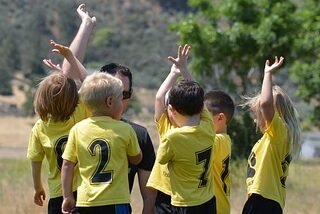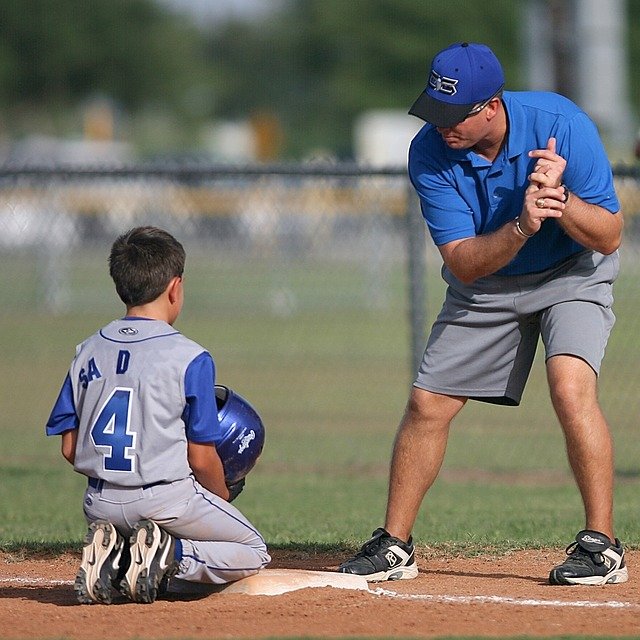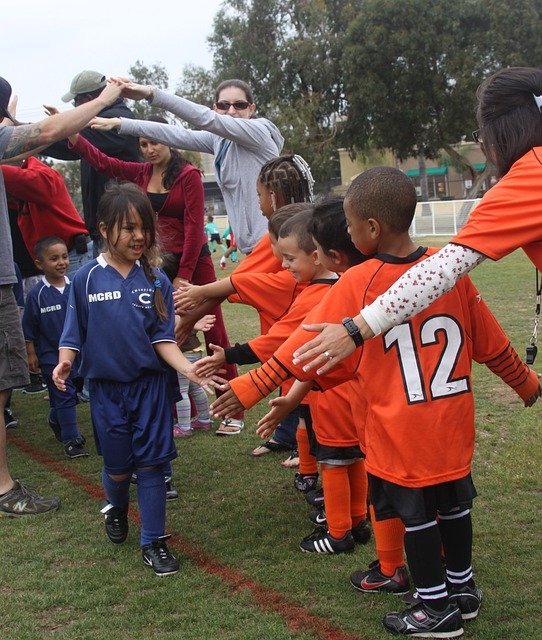Building a Positive Team Culture: Essential Strategies for Youth Sports Coaches
Learn how to create a supportive and inclusive team environment with my strategies designed specifically for youth sports coaches who want to foster a positive culture.

Fitdom 36″ Heavy Duty Extra Large Sports Equipment Duffle Bag

Every Moment Matters, A Must-Read for Coaches
Introduction
The Importance of Building a Positive Team Culture in Youth Sports
Hi, Coach Johnny again.
When examining youth sports, the focus should shift from winning games to winning hearts and minds.
Building a positive team culture isn’t just about producing great athletes; it’s about nurturing young people into becoming great individuals.
In this post, I’ll share proven strategies for helping youth sports coaches foster a more supportive and inclusive environment while still striving to produce results.
Why Team Culture Matters
Before diving into the strategies, let’s delve deeper into why team culture is crucial.
A positive team culture is not just an optional extra; it’s the backbone of any successful sports program.
Here’s how a strong team culture can make a real difference:
Increased Athlete Satisfaction
When the team culture is positive, athletes are more likely to enjoy participating in the sport.
This enjoyment is critical, especially in youth sports, where the primary goal is to foster a lifelong love of physical activity instead of just winning all the time.
Athletes who feel supported and appreciated are more satisfied and committed to the team and the sport.
Enhanced Teamwork

A positive culture fosters an environment where players learn to trust and support one another. This trust is fundamental to effective teamwork.
In sports, where cooperation is key, a team that communicates well and works together seamlessly will often outperform teams with superior individual talents but poor synergy.
Improved Performance
Team culture has a direct impact on performance. Athletes who feel part of a supportive environment are more motivated to improve, not just for themselves but also for their teammates.
Also, a positive atmosphere reduces anxiety and allows athletes to play at their best.
Teams that operate in a positive culture often see significant improvements in performance because each member is encouraged to excel in a pressure-free environment.
Lower Dropout Rates
Sports can be challenging on its own, with physical demands and competitive pressures that can lead to burnout, especially among young players.
However, a positive team culture can mitigate these challenges. When athletes feel part of something larger than just competition—part of a supportive community—they are less likely to drop out.
A Setting Where Every Athlete Feels Valued
It is crucial to create a culture where every individual feels understood and essential to the team’s goals. This sense of belonging can boost an athlete’s self-esteem and promote a healthy psychological state.
Fostering a positive team culture in youth sports goes beyond the field or court. It’s about developing character, encouraging growth, and nurturing a supportive environment where young athletes thrive in their sports and grow as individuals.
This foundation benefits athletes while on the team and equips them with valuable interpersonal skills for life.
Foster Open Communication
Fostering open communication is a cornerstone of building a positive team culture.
Open lines of communication help resolve issues and contribute significantly to developing trust and respect among team members. Here’s how coaches can actively promote this within their teams:
Encourage Athlete Expression
Create a safe space where athletes feel comfortable expressing their thoughts and feelings.
This can be reached through regular open-forum team meetings where athletes are urged to speak freely about their experiences, concerns, and suggestions.
Such openness helps athletes feel valued and heard, fostering a sense of ownership and belonging within the team.
Implement Regular Team Meetings and One-on-One Sessions
Hold regular team meetings to discuss goals, address concerns, and celebrate achievements. These meetings keep everyone aligned and informed about team progress and upcoming plans.
Additionally, one-on-one sessions with individual athletes allow for more personal communication.
These sessions are crucial for understanding each athlete’s unique needs, ambitions, and personal issues that may affect their performance or team dynamics.
Address Issues Proactively

When communication lines are open, information flows more freely, enabling coaches to identify and address potential issues before they escalate.
Whether it’s a misunderstanding between teammates or an athlete’s personal struggle, early intervention can prevent more significant conflicts and maintain team harmony.
This proactive approach shows the athletes that their well-being is a priority, which can significantly boost morale.
Share Positive Feedback
Positive reinforcement is a powerful tool in any coach’s arsenal. Regularly acknowledging individual and team achievements can motivate athletes and reinforce behaviors that coaches want to see repeated.
Feedback should be specific and tied to the team’s values and objectives.
This encourages good behavior and reinforces the message that efforts are noticed and appreciated.
Encourage Peer-to-Peer Communication
Promote an environment where athletes feel comfortable communicating constructively and supportive.
Peer-to-peer communication can enhance team chemistry and provide a support network, making the team more resilient and united.
Teaching athletes how to give and receive feedback from each other fosters a culture of continuous improvement and mutual respect.
Remember that this is easier with older athletes, 12+ years old, and even then, with your guidance.
You would know your audience best regarding younger athletes, but ensure that the parents are present regardless of age.
Recruit them to help guide the narrative and not become part of it. It’s a balancing act, but it could be a learning experience for everyone.
Utilize Various Communication Tools
In today’s digital age, incorporating various communication tools can enhance interaction.
Tools like group chats, email newsletters, and social media groups can keep the team connected outside practice sessions.
They also provide platforms for sharing motivational messages, scheduling updates, and celebrating team milestones.
Prioritizing open communication creates a transparent, supportive environment that empowers athletes, enhances team cohesion, and drives performance.
This strategy is about actively talking and listening to what athletes say—verbally and nonverbally.
A coach’s ability to communicate effectively and listen can transform an average team into a great one.
Celebrate Individual and Team Successes
Celebrating individual and team successes is crucial in fostering a positive team culture.
This strategy goes beyond celebrating wins on the field—it acknowledges the effort, improvement, and sportsmanship that contributed to those victories.
Here’s how coaches can effectively implement this strategy:
Recognize Effort and Improvement
Coaches must recognize the outcomes and the efforts that lead to those outcomes.
This means celebrating the hard work athletes put into practice, their dedication to improving a particular skill, or their persistence in overcoming a challenge.
Recognizing improvement helps athletes see that their efforts are valued, motivating them to continue working hard.
Celebrate Sportsmanship
Sportsmanship is a critical component of youth sports and should be celebrated just as much as physical achievements.
Acknowledge moments when athletes show great sportsmanship, like when they help an opponent up or cheer on a teammate from the sidelines.
Celebrating these behaviors reinforces their importance and encourages other team members to act similarly.
Create a Culture of Shared Success
Make it a point to celebrate team achievements as enthusiastically as individual accomplishments.
When the team wins a game, highlight the contributions of all players, not just the stars. This helps create a culture where success is shared, and every player knows their role is necessary.
It fosters a sense of unity and collective responsibility among the team.
Use Diverse Recognition Methods
Recognition can come in many forms, and how you celebrate successes can keep athletes engaged and appreciated.
Some methods include shout-outs at team meetings, awards for ‘Player of the Game’ or ‘Most Improved Player,’ feature articles in team newsletters, or posts on team social media pages.
Even small tokens like certificates or badges can have a significant impact.
Include the Community
Involve parents, school staff, and the local community in celebrating your team’s successes.
This might include organizing a team event after a significant win or an end-of-season party where athletes, staff, and supporters can celebrate.
Including the community boosts the recognition and strengthens the support network around the athletes, encouraging their morale and pride in their achievements.
Reflect on the Journey
Regularly reflect with the team on their accomplishments over the season, highlighting highs and lows.
This reflection serves as a celebration of progress and success and a learning tool to understand what worked well and what could be improved, never what went “wrong.”
This is precisely the type of language you never want to use.
Implementing these practices creates an environment where team members feel valued and recognized for their contributions.
This approach boosts morale and motivates athletes to continue improving, contributing to their personal growth and the team’s success.
Promote Inclusivity
Promoting inclusivity is essential for building a team where every player, regardless of skill level or background, feels valued and necessary to the team’s success.
Here are detailed ways to enhance inclusivity:
Encourage Interaction Beyond the Field
Organize team activities that are not limited to regular practices and games.
Social events, team outings, and community service projects provide various opportunities for players to interact in less structured settings than sports practices.
These activities help break down barriers, build friendships, and create a sense of family among team members.
Design Inclusive Practices

Ensure that practice sessions are designed to engage all athletes equally.
Use drills and exercises that allow for varying skill levels to contribute and succeed.
Rotate team roles and responsibilities regularly so everyone can experience different aspects of the game and team dynamics.
Provide Equal Opportunities
Make a conscious effort to give all players equal opportunities to participate and shine.
This might mean rotating starting lineups or assigning leadership roles to different players throughout the season, ensuring that each athlete feels they are a valuable contributor to the team’s efforts.
Lead by Example
As a coach, your actions and conduct set a powerful example for your team. Here’s how you can effectively lead by example:
Demonstrate Enthusiasm and Commitment
Show genuine enthusiasm for the sport and your players’ well-being. Attend practices and games with a positive attitude and demonstrate commitment to the team’s goals.
Your passion and dedication will likely inspire your players to show the same level of commitment.
Practice Respect and Fairness
Treat all athletes with respect, regardless of their role on the team or performance level. Make decisions fairly and transparently, and explain your reasoning when needed.
Players who see that everyone is treated fairly are more likely to respect their teammates and the coaching staff.
Show Consistency
Be consistent in your expectations and how you apply rules. Consistency helps build trust and lets players know what they can expect from you.
It also teaches them the importance of composure and reliability, both on and off the field.
Be a Role Model for Sportsmanship
Display sportsmanship at all times. Congratulate opposing teams, respect officials’ decisions, and gracefully handle wins and losses.
Watching you handle various situations with sportsmanship will teach your players to do the same.
Communicate Effectively
Communicate openly and constructively. Provide feedback that is helpful and encouraging, not critical or demeaning.
Effective communication teaches your team how to express themselves and deal with others respectfully and thoughtfully.
You can foster an inclusive environment and set a positive example that encourages your athletes to follow suit.
These practices enhance team performance and contribute to each player’s personal development, creating a legacy of respect, teamwork, and integrity.
Encourage Team Bonding
Team bonding is important for fostering a sense of unity and mutual support among players.
These activities strengthen personal connections and enhance team performance by building a cohesive unit.
Simple and Effective Bonding Activities
Start with simple initiatives like organizing post-game meals or ice cream socials.
These gatherings provide a relaxed atmosphere for players to discuss the game informally and bond over shared experiences.
Incorporate Fun Training Sessions
Organize training sessions focusing on fun and teamwork rather than competition and skills.
Activities like relay races, obstacle courses, or team scavenger hunts can inject fun into practice while promoting teamwork.
Celebrate Birthdays and Personal Milestones
Make it a point to celebrate each player’s birthday, school achievements, or other personal milestones.
This practice shows that the team cares about what happens in each member’s life outside of sports, reinforcing the sense of family.
Provide Constructive Feedback
Constructive feedback is crucial for helping athletes improve their performance and build confidence.
It involves more than just pointing out what needs improvement; it’s about encouraging growth and learning.
Be Timely and Specific
Offer feedback immediately after games, meets, or practices while the details are fresh. Be specific about what was done well and what could be improved.
This specificity helps athletes understand precisely what actions to copy and what to adjust.
Focus on Improvement, Not Criticism
Frame feedback to focus on growth rather than dwelling on mistakes.
For example, instead of saying, “You didn’t pass well,” try, “Next time, let’s work on finding clearer passing lanes.”
Use the Sandwich Method
When giving feedback, use the “sandwich” method: start with something positive, then the area of improvement, and end with another positive.
This method helps balance the feedback and is generally more encouraging for the recipient.
Encourage Self-Assessment
Involve athletes in their development by asking them to evaluate their performance and identify areas they need to work on.
This self-assessment makes the feedback process a two-way conversation and encourages personal responsibility.
Conclusion: The Power of Positive Culture

Building a positive team culture is a dynamic and ongoing endeavor that requires the coach’s commitment, consistency, and creativity.
Remember, the ultimate goal isn’t just about developing athletes who are strong in their sport; it’s equally about shaping individuals who are resilient, respectful, and equipped with character strengths that extend beyond the playing field.
This holistic approach to coaching enriches the athletes’ sporting experience.
It provides them with valuable life skills and establishes a legacy of positivity and growth far beyond the season’s end.
Join the JK Tribe
Coach Johnny is a youth sports coach with over 30 years of experience. He continues to coach various sports in various age groups (pre-high school) for all genders. He is also the founder of Johnny’s Kidz and the JK Tribe. If you would like to support his journey and become a Tribe member, reach out and Buy Coach A Cup of Coffee. And remember, The Game Belongs to Them!
Comments are closed.